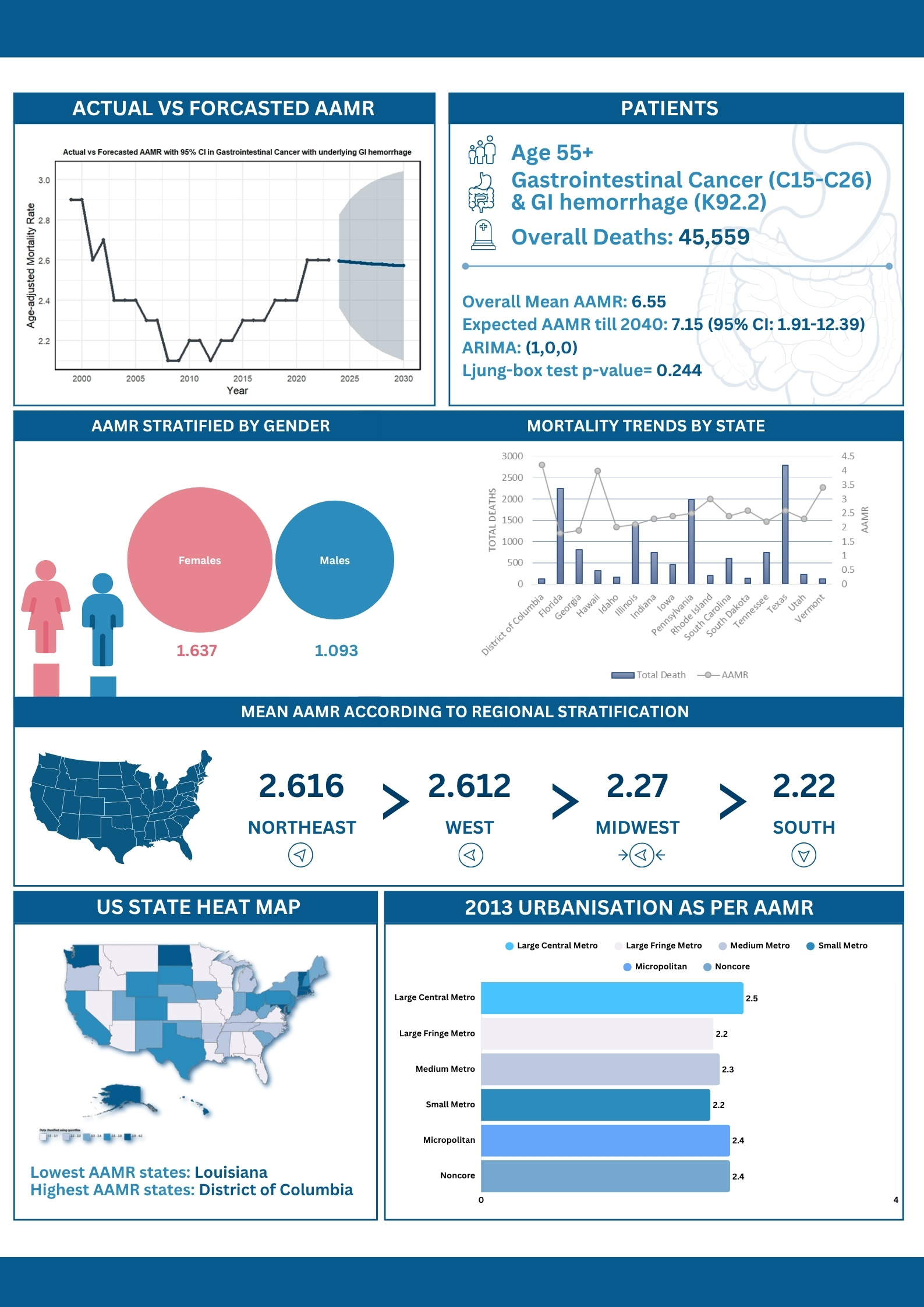Monday Poster Session
Category: GI Bleeding
P3077 - Demographic and Geographic Disparities in Mortality Trends Due to Gastrointestinal Cancer With Underlying GI Hemorrhage: Insights From CDC Wonder Database and ARIMA Model
Monday, October 27, 2025
10:30 AM - 4:00 PM PDT
Location: Exhibit Hall

Muhammad Waqas Afzal, MBBS, MD
Sheikh Zayed Hospital, Rahim Yar Khan, Pakistan
Multan, Punjab, Pakistan
Presenting Author(s)
Anfal Hamza, MBBS1, Sanwal Fida, MBBS1, Talha Sajjad, MBBS, MD1, Arbaz Hassan, MBBS1, Farah Shehryar, MBBS2, Muhammad Waqas Afzal, MBBS, MD3, Sheraz Qasim, MBBS4, Archi Mehta, MBBS5, Zoha Khan, MBBS6, Atif Nawaz Malik, MBBS1, Muhammad Umair Choudhary, MBBS1
1Sheikh Zayed Medical College, Rahim Yar Khan, Pakistan, Rahim Yar Khan, Punjab, Pakistan; 2Khyber Medical College, Peshawar, Pakistan, Peshawar, Sindh, Pakistan; 3Sheikh Zayed Hospital, Rahim Yar Khan, Pakistan, Multan, Punjab, Pakistan; 4Ameer-ud-Din Medical College, Lahore, Pakistan, Lahore, Punjab, Pakistan; 5Gujarat Medical Education and Research Society Gotri, India, Gotri, Gujarat, India; 6Azad Jammu and Kashmir Medical College, Muzaffarabad, Pakistan, Muzaffarabad, Azad Kashmir, Pakistan
Introduction: Malignant neoplasms of digestive organs represent a major global health challenge and remain among the leading causes of cancer-related mortality in the United States. This study aims to examine national mortality trends in the United States among populations with gastrointestinal cancer and comorbid GI hemorrhage.
Methods: Data were retrieved from the CDC WONDER multiple cause-of-death database for the years 1999 to 2023, including individuals aged ≥55 years with a primary cause of death due to malignant neoplasms of the digestive organs (ICD-10 codes: C15–C26), and gastrointestinal hemorrhage (K92.2) listed as a contributing cause. We assessed age-adjusted mortality rates (AAMRs) per 100,000 population as stratified by age, sex, race, Hispanic origin, U.S. Census regions, and 2013 urbanization categories. Joinpoint regression (JPR) was used to estimate Annual Percent Changes (APCs) and corresponding 95% confidence intervals (CIs), with statistical significance determined via Monte Carlo permutation test (p < 0.05). Autoregressive Integrated Moving Average (ARIMA: 1,0,0) approach was used to predict AAMR till 2030.
Results: From 1999 to 2023; 45,559 deaths occurred among U.S. adults aged ≥55 years. The overall AAMR was 2.4 (95% CI: 2.3–2.5) which is expected to reach 2.57 (95% CI: 2.09-3.04; Ljung-box test p-value= 0.244) till 2030. Annual analysis showed an increasing trend from 2009 to 2023 (APC: 1.60%, 95% CI: 1.12–2.24, p < 0.001). Males consistently exhibited higher mortality than females, with 2023 AAMRs of 3.6 and 1.7, respectively. From 1999 to 2002, mortality declined across all racial groups; however, after 2004, rates steadily increased, with Whites showing a significant upward trend (APC: 1.91%, 95% CI: 1.50–2.40, p < 0.001). Hispanic populations experienced a sharp rise from 2021 to 2023 (APC: 11.58%, 95% CI: 4.60–15.90, p < 0.001). Regionally, the highest AAMRs were observed in Census Region 2: Midwest, which showed a significant increase from 2009 onward (APC: 1.95%, 95% CI: 0.82–3.86, p < 0.001). By 2013 urbanization, large central metro areas showed the greatest decline from 1999 to 2014 (APC: –1.50%, 95% CI: –2.0 to –1.0, p < 0.001).
Discussion: Despite early declines, mortality from digestive organ cancers with GI hemorrhage has risen since 2009, with notable disparities by sex, race, region, and urbanization. These findings highlight the need for sustained surveillance and targeted interventions in high-risk populations.

Figure: Graphical illustration: Demographic and geographic disparities in mortality trends due to Gastrointestinal cancer with underlying GI hemorrhage: insights from CDC Wonder database and ARIMA Model
Disclosures:
Anfal Hamza indicated no relevant financial relationships.
Sanwal Fida indicated no relevant financial relationships.
Talha Sajjad indicated no relevant financial relationships.
Arbaz Hassan indicated no relevant financial relationships.
Farah Shehryar indicated no relevant financial relationships.
Muhammad Waqas Afzal indicated no relevant financial relationships.
Sheraz Qasim indicated no relevant financial relationships.
Archi Mehta indicated no relevant financial relationships.
Zoha Khan indicated no relevant financial relationships.
Atif Nawaz Malik indicated no relevant financial relationships.
Muhammad Umair Choudhary indicated no relevant financial relationships.
Anfal Hamza, MBBS1, Sanwal Fida, MBBS1, Talha Sajjad, MBBS, MD1, Arbaz Hassan, MBBS1, Farah Shehryar, MBBS2, Muhammad Waqas Afzal, MBBS, MD3, Sheraz Qasim, MBBS4, Archi Mehta, MBBS5, Zoha Khan, MBBS6, Atif Nawaz Malik, MBBS1, Muhammad Umair Choudhary, MBBS1. P3077 - Demographic and Geographic Disparities in Mortality Trends Due to Gastrointestinal Cancer With Underlying GI Hemorrhage: Insights From CDC Wonder Database and ARIMA Model, ACG 2025 Annual Scientific Meeting Abstracts. Phoenix, AZ: American College of Gastroenterology.
1Sheikh Zayed Medical College, Rahim Yar Khan, Pakistan, Rahim Yar Khan, Punjab, Pakistan; 2Khyber Medical College, Peshawar, Pakistan, Peshawar, Sindh, Pakistan; 3Sheikh Zayed Hospital, Rahim Yar Khan, Pakistan, Multan, Punjab, Pakistan; 4Ameer-ud-Din Medical College, Lahore, Pakistan, Lahore, Punjab, Pakistan; 5Gujarat Medical Education and Research Society Gotri, India, Gotri, Gujarat, India; 6Azad Jammu and Kashmir Medical College, Muzaffarabad, Pakistan, Muzaffarabad, Azad Kashmir, Pakistan
Introduction: Malignant neoplasms of digestive organs represent a major global health challenge and remain among the leading causes of cancer-related mortality in the United States. This study aims to examine national mortality trends in the United States among populations with gastrointestinal cancer and comorbid GI hemorrhage.
Methods: Data were retrieved from the CDC WONDER multiple cause-of-death database for the years 1999 to 2023, including individuals aged ≥55 years with a primary cause of death due to malignant neoplasms of the digestive organs (ICD-10 codes: C15–C26), and gastrointestinal hemorrhage (K92.2) listed as a contributing cause. We assessed age-adjusted mortality rates (AAMRs) per 100,000 population as stratified by age, sex, race, Hispanic origin, U.S. Census regions, and 2013 urbanization categories. Joinpoint regression (JPR) was used to estimate Annual Percent Changes (APCs) and corresponding 95% confidence intervals (CIs), with statistical significance determined via Monte Carlo permutation test (p < 0.05). Autoregressive Integrated Moving Average (ARIMA: 1,0,0) approach was used to predict AAMR till 2030.
Results: From 1999 to 2023; 45,559 deaths occurred among U.S. adults aged ≥55 years. The overall AAMR was 2.4 (95% CI: 2.3–2.5) which is expected to reach 2.57 (95% CI: 2.09-3.04; Ljung-box test p-value= 0.244) till 2030. Annual analysis showed an increasing trend from 2009 to 2023 (APC: 1.60%, 95% CI: 1.12–2.24, p < 0.001). Males consistently exhibited higher mortality than females, with 2023 AAMRs of 3.6 and 1.7, respectively. From 1999 to 2002, mortality declined across all racial groups; however, after 2004, rates steadily increased, with Whites showing a significant upward trend (APC: 1.91%, 95% CI: 1.50–2.40, p < 0.001). Hispanic populations experienced a sharp rise from 2021 to 2023 (APC: 11.58%, 95% CI: 4.60–15.90, p < 0.001). Regionally, the highest AAMRs were observed in Census Region 2: Midwest, which showed a significant increase from 2009 onward (APC: 1.95%, 95% CI: 0.82–3.86, p < 0.001). By 2013 urbanization, large central metro areas showed the greatest decline from 1999 to 2014 (APC: –1.50%, 95% CI: –2.0 to –1.0, p < 0.001).
Discussion: Despite early declines, mortality from digestive organ cancers with GI hemorrhage has risen since 2009, with notable disparities by sex, race, region, and urbanization. These findings highlight the need for sustained surveillance and targeted interventions in high-risk populations.

Figure: Graphical illustration: Demographic and geographic disparities in mortality trends due to Gastrointestinal cancer with underlying GI hemorrhage: insights from CDC Wonder database and ARIMA Model
Disclosures:
Anfal Hamza indicated no relevant financial relationships.
Sanwal Fida indicated no relevant financial relationships.
Talha Sajjad indicated no relevant financial relationships.
Arbaz Hassan indicated no relevant financial relationships.
Farah Shehryar indicated no relevant financial relationships.
Muhammad Waqas Afzal indicated no relevant financial relationships.
Sheraz Qasim indicated no relevant financial relationships.
Archi Mehta indicated no relevant financial relationships.
Zoha Khan indicated no relevant financial relationships.
Atif Nawaz Malik indicated no relevant financial relationships.
Muhammad Umair Choudhary indicated no relevant financial relationships.
Anfal Hamza, MBBS1, Sanwal Fida, MBBS1, Talha Sajjad, MBBS, MD1, Arbaz Hassan, MBBS1, Farah Shehryar, MBBS2, Muhammad Waqas Afzal, MBBS, MD3, Sheraz Qasim, MBBS4, Archi Mehta, MBBS5, Zoha Khan, MBBS6, Atif Nawaz Malik, MBBS1, Muhammad Umair Choudhary, MBBS1. P3077 - Demographic and Geographic Disparities in Mortality Trends Due to Gastrointestinal Cancer With Underlying GI Hemorrhage: Insights From CDC Wonder Database and ARIMA Model, ACG 2025 Annual Scientific Meeting Abstracts. Phoenix, AZ: American College of Gastroenterology.
